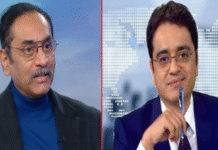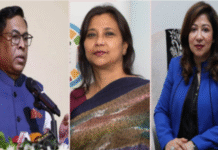Civil servants barely motivated despite high job satisfaction

A whopping 64% believe they cannot be dismissed from service without much ado
A recent survey has revealed that Bangladesh civil servants experience high job satisfaction, in stark contrast to little job motivation and ethical practice.
The survey was carried out by the University of London and the University of Nottingham, with funding by the UK Department for International Development and the British Academy.
Prof Jan-Hinrik Meyer-Sahling from the University of Nottingham revealed the findings in Dhaka on Wednesday afternoon.
He said the survey placed Bangladesh at the second lowest position for work motivation and ethical practices. The survey also identified 64% of the public servants believe it is difficult to be dismissed from civil service.
The two-year-long survey titled “Towards a Better Performing and Ethical Civil Service in Bangladesh” interviewed 1,077 civil servants working at government ministries and departments.
Professor Jan-Hinrik said that the civil service salaries are competitive, especially for the lower and middle ranks. On the other hand, many civil servants are dissatisfied with their salaries, deeming them insufficient to sustain their families.

Prof Salahuddin M Aminuzzaman from the Department of Public Administration at Dhaka University asked: “If civil servants experience lesser motivation work and little ethical awareness of conflicts of interest, then how could they have job satisfaction?”
He mused that it raises the question if the public administration is rationally modelled.
|
The report revealed that awareness of conflicts of interest in the public sector is limited, and in need of improvement among civil servants in Bangladesh.
However, the overwhelming majority indicated that good performance is not reflected in salary levels and increases. The research found that a sectoral approach would reflect a state of the art move to anti-corruption and integrity management in the public sector.
The study observed that personal and political connections are more important to lower-ranking officers, than to higher-ranking ones. Moreover, only a relative minority of civil servants indicated that they could easily find a better-paid job in the private sector.
What do the experts say?
Dr Iftekharuzzaman, executive director of Transparency International Bangladesh, told the Dhaka Tribune: “These findings provide important food for thought for the authorities. It needs to be explored why high job satisfaction is failing to yield high job motivation and ethical awareness. Questions may be raised if low job motivation and low ethical awareness in spite of high job satisfaction represents job satisfaction due to existence and possibilities of benefits from non-compliance and unethical use of respective offices.”
Prof Dr Taiabur Rahman from the Department of Development Studies at Dhaka University said: “Bangladesh is going to graduate from the category of least developed countries, and now is the time to see if civil servants are ready to prove their competence through performance.”

Dr Jan-Hinrik said Bangladesh needs to form evidence-based information system along with ensuring training for officials not only during their initial phase, but also throughout their entire administrative tenure to ensure better performance.
Former Bangladesh Bank governor Dr Atiur Rahman said the private jobs cannot keep up with public jobs due to higher incentives and job security.
He said: “We live in a digital age where social media mirrors society. Whenever something happens, it gets posted on social media. Every sector must introduce feedback units and complaint units to ensure accountability. Only then, people would trust civil servants.”
Planning Minister MA Mannan, chief guest at the program, said the result is somewhat expected and a reform is taking place to solve the problem.
He said: “We want to stand on our own feet. Let the reforms take place, we are on the right track.”
Dr Kamal Abdul Naser, former principal secretary to the prime minister, Prof Abu Eusuf, former chairman of the Department of Development Studies at Dhaka University were among others present at the program.
Dr Tofail Ahmed, a local governance expert, told the Dhaka Tribune: “The survey would not be objective without the inclusion of civil servants in the survey team. Only an insider can shed light on what actually goes on. It would have been better as a case-based qualitative study rather than a quantitative study.
“The public administration process is irrational, political influence is pervasive, and there is a lack of regular training. We need solid recruitment in public services, abolish quota in BCS recruitment, and introduce rewards and punishments with effective monitoring and evaluation process. But most importantly, we need to form a commission to identify and implement administration-wide reforms.”









